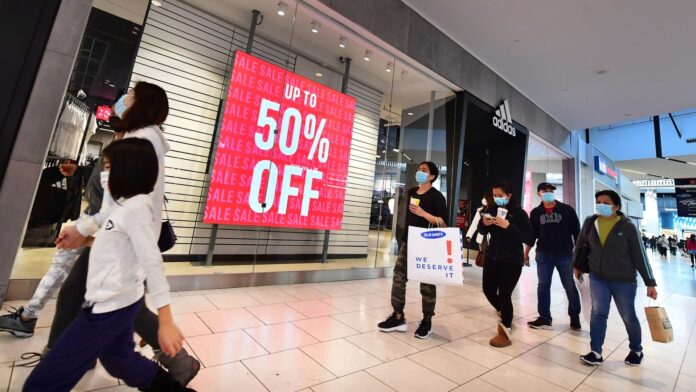People walk stores offering sales at a shopping mall in Santa Anita, California on December 20, 2021.
Frederic J. Brown | AFP | Getty Images
Grocery and energy prices have spiked, and credit card interest rates are climbing, but shoppers can expect some relief as they start holiday shopping.
Retailers, desperate to coax inflation-fatigued consumers to spend, are expected to beef up promotions as they struggle to get rid of already marked-down excess inventory.
“This will be the year of the perpetual deal for Christmas,” said Marshal Cohen, chief industry advisor for the NPD Group, a market research firm.
In some gift categories, merchandise could be marked down by more than 20% on retailers’ websites, according to Adobe Analytics, which tracks online sales. Computers, electronics and toys are all expected to hit the deepest discounting levels since Adobe started tracking figures in 2017.
The abundance of deals is a sharp departure from a year ago. Last holiday season, shoppers started buying gifts early to avoid out-of-stocks and shipping delays. Concerns about not getting hot items meant consumers were willing to pay up.
This year, though, retailers have an abundance of merchandise. Shoppers are reluctant to spend as they pay more for food, housing, health care and other items as inflation hovers around a four-decade high. People are also spending more on travel and experiences after two-plus years of Covid restrictions.
Even with the bigger discounts, industry watchers expect a muted holiday season because of households’ stretched budgets. Consulting firm Bain & Co. forecasts growth of as much as 7.5% from last holiday season, but when adjusted for inflation, that is only 1% to 3%. Consulting firm Alix Partners projects a 4% to 7% increase in sales year over year — but that is a decline when factoring in the current year-over-year inflation rate of 8.2%.
“It’s food, it’s medical care, it’s housing and shelter costs. It’s essential services such as veterinary care, and child care,” said Leo Feler, chief economist at market researcher Numerator. “All of these things come first before consumers buy holiday gifts.”
Plus, customers may not even want some of the items that retailers are putting on sale. Computers, the category that’s expected to have the highest level of discounting during the holiday season, according to Adobe, has seen cooling demand. HP, Dell and Lenovo have all reported a decline in shipments of personal computers.
The return of steep discounting will be a tough pill to swallow for companies. It is pressuring retailers’ profit margins, as they juggle higher costs. Already, Walmart, Target and Best Buy have cut their profit outlooks as the retailers navigate a more promotional environment. Walmart leaders have said even higher-income households are trading down to buy cheaper groceries, raising concerns that they may hesitate to splurge on gifts, decor and other holiday items.
Parade of promos
As shoppers lounged at the pool and went on long-awaited vacations this summer, the drumbeat of promotions was already underway. More items were on sale during backyard barbecue season than during peak holiday season a year ago.
During the second week of July, 46% of units were on promotion, according to the NPD Group. That’s higher than the 41% of units on promotion during the fourth week of November 2021 — the kickoff to the holiday shopping season.
When Amazon threw its Prime Day in July, Walmart opted out of its own sales event because so much of its merchandise was already on sale.
Sales have picked up again in recent weeks, too. In October, Amazon threw a Prime Day-like sales event, the first time it has had two discount days in the same year. Target and Walmart got started early, too, with Target’s Deal Days running a week before the Amazon event and Walmart’s Rollback & More event overlapping with it.
This week, Walmart announced it will have savings events that kick off every Monday in November on its website and then continue in its stores. Customers who belong to its subscription service, Walmart+, will get access to hot deals and popular items seven hours early.
Promotions will be especially pronounced in certain categories. Apparel and the sports and outdoors category have already had a noticeable jump in discounts at Walmart and Target compared with the year-ago period in September, according to YipitData, a research firm that collects data from consumer receipts and scrapes retailers’ websites.
For instance, at Walmart, apparel items sold at an approximately 20% discount, up from about 7% in 2021 for the two-week period ending Sept. 17. At Target, apparel items sold at an approximately 18% discount, up from about 4% in the year-ago period.
A clearance sale sign is seen at the Gap retail store on September 20, 2022 in Los Angeles, California.
Allison Dinner | Getty Images
Beauty, on the other hand, has had few discounts — which may reflect consumers’ willingness to keep spending on self-care or little luxuries like lipstick and lotion, even if budgets are tight in other areas. Discount levels across Ulta Beauty categories were either stable or down slightly year over year for the two weeks ending Sept. 17, YipitData found.
The level of discounting by retailers will also depend on their customer bases, said Numerator’s Feler. Dollar stores or other discounters, for instance, will need be more sensitive to consumers’ budget constraints. But luxury brands, which have higher-income customers, won’t have to adjust as much, with sales in the category remaining strong.
For shoppers like Rebecca Kirschner, the promotions over the past six months mark a welcome change. The New York City resident and her fiancé just registered for their wedding, and nearly everything was on sale
A year ago, she recalled shelves being emptier. This holiday season, she expects the money she spends on family and friends will go farther.
“It feels like you went from half a plate of food to a buffet,” said Kirschner, 33. “Every store you go into has a big sales section now.”


